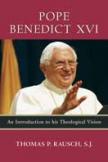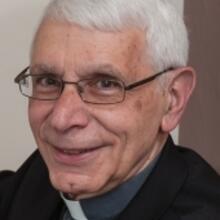Papal Review
Thomas P. Rausch, S.J., a professor of theology at Loyola Marymount University in Los Angeles, is an insightful and perceptive theologian, whose writing is blessedly straightforward and clear. He brings these gifts to bear in a new book that offers “a respectful exploration” of the “theological vision” of Joseph Ratzinger/Pope Benedict XVI.
An opening chapter, “From Professor to Pope” traces some of the biographical details of Joseph Ratzinger’s life and ministry, from his “Bavarian roots” to his somewhat surprising election to succeed John Paul II in the Chair of Peter. Though the facts are familiar, Rausch’s keen theological eye sees beyond the merely journalistic, as when he writes: “Even [Benedict’s] controversial address at Regensburg in 2006 managed to lift up these questions of reason and faith, and thus of human rights and religious authority in Islam, as well as Islam’s attitude toward violence done in its name.”
The succeeding chapters of the book proceed in systematic fashion, beginning with an overview of the pope’s theological vision, especially the influences that helped shape it. Here Rausch examines the young Joseph Ratzinger’s debt to the theologies of St. Augustine and St. Bonaventure, the subjects of his earliest scholarly works, and sketches their continuing influence upon him, both as theologian and as pope. Next come chapter-length discussions of the pope’s views on Scripture, his Christology (with special attention to his book Jesus of Nazareth), his teaching on church and his theoretical and pastoral convictions regarding liturgy. Rausch concludes with a helpful epilogue that provides an insightful summary and voices some cautious “concerns.”
Chapter Three, “Pope Benedict and Scripture,” is of particular importance. In it Rausch gives a helpful summary of the pope’s longstanding views, from his youthful commentary on the Second Vatican Council’s “Dogmatic Constitution on Divine Revelation” to his intervention during the deliberations of last fall’s Synod of Bishops on The Word of God in the Life and Mission of the Church. Rausch captures well the pope’s persuasion:
Ratzinger’s insistence that the Christian faith itself with its Christological center is the hermeneutic that allows the Bible to be itself is one that needs to be acknowledged today. He insists on the unity of the biblical tradition, even if this is a theological principle, not “an immediate historical datum.” If the Bible is to be understood as God’s word, it must be read and reread within the context of the life and liturgy of the church from which it originated. Only in this way can it be for the church a revelatory text.
In many respects Pope Benedict’s reflections on Christology, church and liturgy represent the unfolding of the fundamental principles summarized in the foregoing excerpt. His Christological hermeneutic appropriates a Johannine perspective upon the ultimate identity of Jesus of Nazareth. Jesus is not merely a prophet who speaks God’s words; his person is the Word whom God speaks.
The church itself is not any people, but the pilgrim people of God, whose identity can be done full justice only in explicitly theological and Christological terms. And the Christian community’s most proper realization as church occurs in eucharistic celebration and communion, where the body recognizes its head in the breaking and sharing of the bread. For Ratzinger, as Rausch perceptively states, “the Eucharist becomes both the origin of the church and its center.”
What is especially striking in the book, however, is not so much the exposition of the pope’s theology as the author’s appreciative and critical engagement with it. Thus the book is as revelatory of Rausch as it is of Ratzinger, and it impels the reader also to enter into the stimulating conversation.
The author seriously and fairly engages the pope’s theological vision, but the reader cannot help sense a certain reserve. Thus phrases like the following dot the presentation: “While there is a certain truth here…;” “While of course there may be some truth to what he says…;” “This is not entirely wrong.” At times Rausch seems to ascribe some of the pope’s stances that he finds problematic to Benedict’s “Augustinian” propensities. (It must be noted, though, that Rausch, in more careful mode, rightly concedes that “the contrast between Augustine and Aquinas can be overemphasized.”)
Perhaps the more telling contrast is between Ratzinger and Rahner. Rausch’s reservations seem to be, in the main, “Rahnerian” in nature. They include the pope’s supposed neglect of “experience,” of “historical consciousness” and of “pneumatology.” Now each of these categories, as Rausch well knows, requires much clarification and elaboration—much more than can be realistically accommodated in an “Introduction.” Where the conversation would become most fruitful, therefore, would be in engaging these issues at considerably greater length and with sustained depth.
Such conversation might begin where Rausch ends his book. He acknowledges that “there is an essentially ‘conservative’ dimension to [Pope Benedict’s] ministry in the best sense.” But his very last sentence reads: “But to be a good pastor of the universal church he must also be able to read what Vatican II called ‘the signs of the times’ (GS 4).” The discernment pressing upon us, then, concerns precisely which “signs of the times” are most exigent for the Christian community 40 years after Vatican II.
Those who find Pope Benedict’s theological vision compelling hold that experience, historical consciousness and even pneumatology must be measured by the norm of Christ, for “not every spirit is to be trusted” (1 Jn 4:1). Many of my students find in Pope Benedict’s magnificent homilies, largely neglected in Rausch’s book, a Christological mystagogy that seeks to “bring all thoughts into captivity to Christ” (2 Cor 10:5). From this vantage, Benedict’s theological “method” is, perhaps, less “Augustinian” than it is “Pauline,” recapitulating all in Christ, the center in whom all things hold together.
Impelled and guided by this conviction, the conversation Rausch has helpfully initiated in this book can lead to a spirited and indeed urgent exchange—one whose importance for the life and mission of the church can scarcely be emphasized enough.
This article also appeared in print, under the headline “Papal Review,” in the October 12, 2009, issue.








